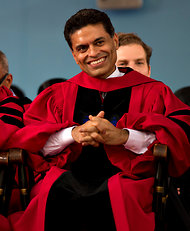The Man Booker Prize, which had been open to English-language novels from Britain and the Commonwealth, has just gone global, producing anxiety about damage to cultural diversity and fears that the American cultural hyperpower that dominates movies and television will crush the small literary novel.
“It’s rather like a British company being taken over by some worldwide conglomerate,” said Melvyn Bragg, an author and television host in Britain.
The Booker Prize for fiction, begun in 1969, was always something that Britain and its former territories could call their own, seen as a bulwark against the spread of the American novel, that globalized product of the world’s richest market.
The award — with its publicity, its paycheck and its immediate impact on sales — has been an important boost to the careers of Canadians like Michael Ondaatje and Yann Martel, and Indians like Kiran Desai and Aravind Adiga. It has brought attention to novelists previously unknown and unpublished in the United States, and it has been an important encouragement to publishers of quality fiction.
This week, the chairman of the Booker Prize Foundation, Jonathan Taylor, said, “We are abandoning the constraints of geography and national boundaries” to become a truly international prize, as a result of consultations that began in 2011. The change could enhance the Booker’s “prestige and reputation through expansion, rather than by setting up a separate prize” for Americans, he said.
Next year, the prize will be open to any work originally written in English and published in Britain, not just works by citizens of Britain, the Commonwealth, Ireland and Zimbabwe, bringing immediate concerns that American novels will dominate, “simply through an economic superpower exerting its own literary tastes,” the British novelist Philip Hensher, who has been both a Booker finalist and a judge, said in an interview.
More troubling, he said, will be the loss of “new, interesting voices.” American novels are already culturally dominant, he said: “It’s hard to think of American novels that don’t make their way into the larger English world. But I can think of Canadian, Indian, African novels that struggle to find a broader readership.”
Karolina Sutton, a literary agent who works with both American and British authors, said that the winner of the Booker sometimes sees a sales bump of hundreds of thousands of copies, an effect that could multiply if the winner were American.
“I think it’s terrific for American publishers, terrific for American writers, and it’s not bad news for readers,” she said. “It will suddenly become more competitive.”
Criticism of the prize has been a literary sport since its inception, with complaints about the winners, the judges and even the prize dinners. A. L. Kennedy, who was a judge in 1996, famously and ungrammatically said that the winner was determined by “who knows who, who’s sleeping with who, who’s selling drugs to who, who’s married to who, whose turn it is.”
Ms. Kennedy is in favor of the expansion of the Booker, however, noting that other, newer prizes open to any English-language novel published here, like the Folio Prize (£40,000, or about $64,000, which makes its first award next January) and the International Impac Dublin Literary Award (100,000 euros, or about $135,000, and also open to translations) have been “nipping at its heels.” The Man Booker award comes with a prize of £50,000, or about $80,000.
The Booker has also become less literary, some argue, suggesting that since the Man Group, a multinational financial company, took it over in 2002, the renamed Man Booker Prize has become more middlebrow.
Even this year, one of the six finalists, Jhumpa Lahiri’s “Lowland,” has been criticized as an American novel. Born in London, Ms. Lahiri moved to the United States at the age of 2 and generally writes about the experience of exiles living in the United States.

Julie Bosman contributed reporting from New York, and Kimiko de Freytas-Tamura from London.
This article has been revised to reflect the following correction:
Correction: September 21, 2013
An earlier version of this story contained an incorrect figure for the monetary award that accompanies the Man Booker Prize. It is £50,000, or about $80,000.
Article source: http://www.nytimes.com/2013/09/21/books/the-backlash-to-the-american-invasion-of-the-booker-prize.html?partner=rss&emc=rss
